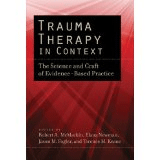“Trauma Therapy in Context: The Science and Craft of Evidence-Based Practice”

“Trauma Therapy in Context: The Science and Craft of Evidence-Based Practice”
Edited by Robert A. McMackin, Elana Newman, Jason M. Fogler & Terence M. Keane
American Psychological Association
Washington, D.C. 2012
Book on trauma brings together science, practice
Reviewed by Paul Efthim, Ph.D.
The field of modern trauma therapy has struggled to overcome a variety of fissures, fractures and splits. Examples of polarization over the years include the conceptual binary of single-incident PTSD versus complex PTSD, manualized treatment protocols versus relationally-based approaches and lab-tested “empirically validated” therapies versus “real-world” approaches drawn from the trenches of clinical practice.
Recently, researchers have begun to develop more ecologically sophisticated approaches to studying trauma and its treatment. An excellent example is a recent book by a group of leading scholars, “Trauma Therapy in Context.” This 400-page edited compendium is a group effort, with more than half of the 42 contributors hailing from New England, including 15 researchers from the Boston VA Hospital led by co-editor and luminary Terence Keane.
A major theme that emerges from this collective effort is the importance of cross-fertilization between science and practice. When I beheld the phrase “evidence-based” in the subtitle, I braced myself for a slog through simplistic treatment models targeted to a narrow problem area, such as cognitive therapy for left-handed white college students who had experienced a car accident. To my relief, the book incorporates a variety of perspectives that draw both from research and clinical practice.
Impressively, the first chapter is written by a psychoanalyst (Jacob Lindy) who presents a compelling case for the need to hold room for complexity, paradox, ambivalence and existential specificity in listening to traumatized individuals. He decries the triumph of “scientific” approaches taught to today’s graduate students that promote technological skills in delivering treatment at the expense of authentic engagement and mutuality.
As with most edited books of its type, this volume is a bit of a potluck experience. The editors wisely imposed some order by grouping the material into four sections. After an opening interview with Judy Herman (arguably the dean of trauma studies in this country), the first section focuses on the central importance of listening. The second part reviews the research on resilience and recovery, while the third section covers how meaning-making facilitates healing. Finally, the last part addresses a variety of integrated treatment approaches to trauma.
The most clinically relevant chapters cover specific topics such as the cultivation of hope, narrative therapy techniques, spiritual factors, chronic pain and the co-occurrence of trauma and substance abuse. On this last issue, there is an important chapter that outlines the Seeking Safety approach developed by Lisa Najavits of the Boston VA. This model offers a straightforward set of simple tools for substance-abusing patients with trauma histories. If you work with this population, you probably know about Seeking Safety, but if not, it’s well worth checking out.
Psychology researchers have improved their ability to address the complexities inherent in studying trauma, but there is still a ways to go. The contributors to this volume do an excellent job reviewing the available evidence and point toward areas for further study. There are some puzzling omissions – two major treatment approaches (EMDR and DBT) are not considered in these pages. On the whole, however, this book succeeds in its stated goal to expand clinicians’ skill sets. It also sets a nice tone that helps bring together the frequently disconnected fields of science and practice.
Paul Efthim, Ph.D. is a licensed psychologist in private practice in Brookline, Mass. He holds a faculty appointment at the Boston Institute for Psychotherapy and is a candidate at the Massachusetts Institute for Psychoanalysis.
Learn more about the book: Trauma Therapy in Context: The Science and Craft of Evidence-based Practice
